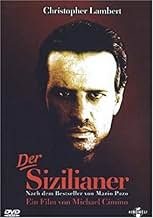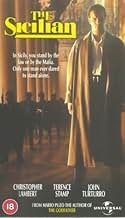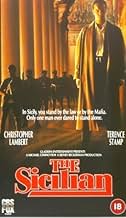NOTE IMDb
5,4/10
5,7 k
MA NOTE
Le bandit égocentrique Salvatore Giuliano combat l'Église, la mafia et la noblesse terrienne tout en dirigeant un mouvement populiste qui se bat pour l'indépendance sicilienne.Le bandit égocentrique Salvatore Giuliano combat l'Église, la mafia et la noblesse terrienne tout en dirigeant un mouvement populiste qui se bat pour l'indépendance sicilienne.Le bandit égocentrique Salvatore Giuliano combat l'Église, la mafia et la noblesse terrienne tout en dirigeant un mouvement populiste qui se bat pour l'indépendance sicilienne.
- Réalisation
- Scénario
- Casting principal
Avis à la une
One of the underlying problems with Michael Cimino's film is that it makes the remarkable Sicilian countryside do too much of the narrative work. If you were to watch the film with the sound turned off -- saving you from the stilted dialogue and the gushy score -- you might think much better of the whole enterprise, so powerful is the photography of those rugged mountains and steep canyons. But everything is so visually splendid that it undermines any sense that the poor are actually suffering and starving out there. A travelogue does not always make for good storytelling. And, of course, the pan-and-scan version, the only one currently available on DVD, chops out most of the landscape, limiting the impact of the movie's visual achievement.
Another problem for Cimino's film is that there's actually a much better version of the same story from an earlier director. Few people seem to be aware of the earlier treatment. In 1962, the great Italian director Francesco Rosi released his superb version under the title "Salvatore Giuliano." It's in black and white, but gloriously so. The massacre of the peasants in Rosi's version is one of the most heartbreaking and dramatically memorable sequences in the history of Italian film. And throughout, the dark ambiguity of the main character remains consistently compelling, within a far more complex storytelling mode than Cimino's surprisingly straightforward Hollywood-inflected retelling. The Rosi film deserves to be much better known.
Another problem for Cimino's film is that there's actually a much better version of the same story from an earlier director. Few people seem to be aware of the earlier treatment. In 1962, the great Italian director Francesco Rosi released his superb version under the title "Salvatore Giuliano." It's in black and white, but gloriously so. The massacre of the peasants in Rosi's version is one of the most heartbreaking and dramatically memorable sequences in the history of Italian film. And throughout, the dark ambiguity of the main character remains consistently compelling, within a far more complex storytelling mode than Cimino's surprisingly straightforward Hollywood-inflected retelling. The Rosi film deserves to be much better known.
Cimino is one of the very rare species on earth that can create a "MOOD' that leads to the very cradle of western civilization. The Roman Empire. As a foreigner who has lived in an Italian town for a year, I come to see that the colossal heart of every Italian man can only be captured with its gist by Cimino. And no other up till date. It comes from lighting, its shadow, its colours, its smell even on screen, its silhouettes, its accents, its breathing space, and his very own colossal heart that can contain it all. You do feel that he has achieved that sacred task in showing us THE SICILIAN. Nobody has that feeling ever been captured with rapture that its texture is almost noble, royal, yet sacred. But in its careful craftsmanship of Cimino, you find it everywhere, and it is just everywhere that overflows: its costumes, its lighting, its camerawork, its juxtaposition, its projections, so on and so forth. Its tempo of the film makes you flow like a river that breeds lives and cultures at the very same time.
The European-release version of "The Sicilian" is 31 minutes longer than the US version. Supposedly, the director was ordered to deliver a version under 2 hours, so he recut the film to render it incoherent with the expectation that Fox would have to release the complete film. Only, they went ahead and released the deliberately botched shorter cut. This may be apocryphal, but it would help explain the critical drubbing it got in this country. I was lucky enough to see the complete film in Paris and was mesmerized. Gore Vidal was denied credit for the screenplay, but the film has a literacy, intellectual depth and acidity that is pure Vidal; the character played by Terrance Stamp is essentially Vidal's stand-in. The only comparable film might be "The Godfather," but with an even stronger historic/political context. It is certainly the highpoint of Michael Cimino's career to date, and I'm one of those odd ducks that fervently admires "Heaven's Gate". If you can see this in Europe, or if it comes out over there on DVD and you have a region-appropriate DVD player, grab the opportunity to see it.
I read the novel by Mario Puzo quite a few years ago, but do not remember a thing about it, unlike most other Puzo works that I have consumed. So, maybe the source material was a bit lacking. If I remember correctly, Michael Cimino had already destroyed one studio, and well, I don't know how much was invested in this one, but I hope not too much. Cimino was obviously shooting for the sweeping epic, but ended up hitting soap opera level melodrama. The high points were the scenery, the cinematography, and the score. The low points were the plot and the acting. Christopher Lambert badly needed a charisma injection before trying to play this part. Joss Ackland was adequate as the mafia don, and Terence Stamp as the enigmatic prince, but the rest of the cast, ick. Cannot recommend this one.
This film is not as bad as many say. It is somewhat melodramatic at times, but not too often. I really enjoy watching it and recommend it. The main problems with the movie are, the music and acting. The opening song in the film is great and it leads you to believe the film will be a near masterpiece. But there is this one song that is used during some romantic moments, and it just plain sucks. It kills any effect the film had. Then there is the acting. Lambert is one of the worst actors i have ever seen. Simple. However, this movie is probably his best work. The violence in the film is intense which keeps your attention and the cinematography is rather beautiful (One of Cimino's greatest abilities) So, if you can find a copy, watch it.
Le saviez-vous
- AnecdotesThe novel is a spin-off of The Godfather (set during Michael's exile in Sicily), however all references to the Corleones are omitted from the film.
- GaffesThe film shows Giuliano trying to stop the massacre at Portella della Ginestre (blamed in the film on Terranova, who was one of the few of Giuliano's band who it's definitely known did NOT fire a single shot on that day). In reality Giuliano always accepted full responsibility for the massacre and expressed no sorrow for the victims.
- Citations
Salvatore Giuliano: You're an American, aren't you?
Camilla, Duchess of Crotone: Yes, and like every other Sicilian you want to go to America and start a pizzaria in Jersey.
- Crédits fousThe 20th Century Fox logo is in black-and-white.
- Versions alternativesOriginally released at 115 minutes in the USA. A 146-minutes director's cut is available on video and at least in Europe as a region 2 DVD.
- ConnexionsEdited into Lo schermo a tre punte (1995)
- Bandes originalesDomanda al ciel ... Dio, che nell'alma infondere
from "Don Carlo, Act II"
Written by Giuseppe Verdi
Performed by Enrico Caruso and Antonio Scotti
Meilleurs choix
Connectez-vous pour évaluer et suivre la liste de favoris afin de recevoir des recommandations personnalisées
- How long is The Sicilian?Alimenté par Alexa
Détails
Box-office
- Budget
- 9 000 000 $US (estimé)
- Montant brut aux États-Unis et au Canada
- 5 406 879 $US
- Week-end de sortie aux États-Unis et au Canada
- 1 720 351 $US
- 25 oct. 1987
- Montant brut mondial
- 5 406 879 $US
- Durée
- 1h 55min(115 min)
- Couleur
- Rapport de forme
- 2.35 : 1
Contribuer à cette page
Suggérer une modification ou ajouter du contenu manquant






































